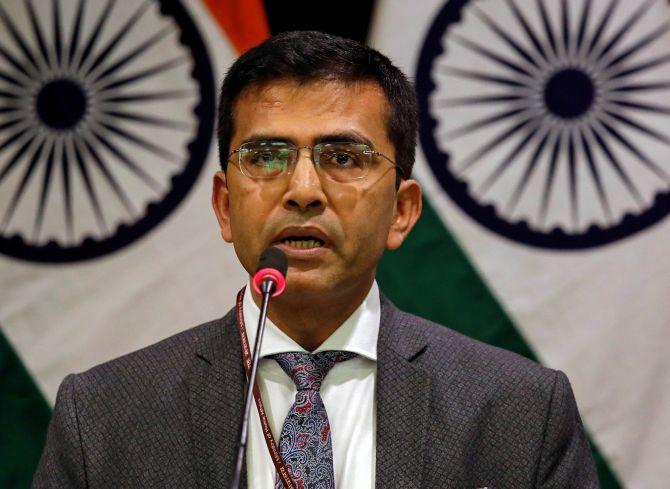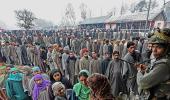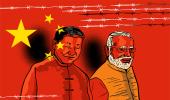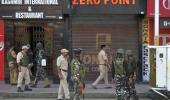
India on Friday said it 'deeply regrets' the statements of Turkey and Malaysia attacking New Delhi on the Kashmir issue, and termed it an internal matter.
External Affairs Ministry Spokesperson Raveesh Kumar said India has friendly ties with both the countries.
He reiterated India's position that Pakistan had invaded and illegally occupied parts of Jammu and Kashmir and the current developments in Jammu and Kashmir and Ladakh are purely its internal matter.
Kumar called upon Ankara, which has issued several statements on Kashmir since August 6, to have a proper understanding of the situation in Kashmir before making further comments.
"India and Turkey are friendly countries. We, therefore, deeply regret that since August 6, there have been repeated statements by the Turkish government on a matter completely internal to India. These statements are factually incorrect, biased and unwarranted," Kumar said.
Malaysian Prime Minister Mahathir Mohamad had raised the Kashmir issue at the United Nations, alleging that India had 'invaded and occupied' Jammu and Kashmir and asked New Delhi to work with Pakistan to resolve the issue.
Kumar said India and Malaysia have traditionally enjoyed good and friendly ties.
"This relationship has been enhanced in recent years. We have noted the comment on Jammu and Kashmir by the prime minister of Malaysia. We deeply regret these comments since they are not based on facts," Kumar said.
"Government of Malaysia should bear in mind the friendly relations between the two countries and desist from making such comments," he added. PTI PR
'Imran's statements reflect he is not aware how international relations are conducted'
India also condemned the 'provocative and irresponsible' statements against it by Pakistan Prime Minister Imran Khan and said he is unaware of how international relations are conducted.
Kumar said the comments made by Khan do not behove the post he holds.
Kumar was responding to a question on the call for a march from Pakistan-occupied Kashmir to the Line of Control, which has been backed by Pakistan's military, to protest India's move.
At a rally held last month, Khan said he knew that majority of the youth in PoK wanted to stage the march to the LoC.
However, he asked them to defer it until he fought the case at the United Nations General Assembly.
"This is not the first time that such statements have come from Pakistan. Pakistan's prime minister holds a high constitutional office. He has given such statements even before. You have heard his statements even in the UNGA... such provocative and irresponsible language he has used. We condemn this," Kumar said.
In his maiden speech at the UNGA last month, Khan raised the Kashmir issue and demanded that India must lift the 'inhuman curfew' in Kashmir and release all 'political prisoners'.
Khan devoted half of his address to the Kashmir issue, warning that if there's face-off between two nuclear-armed neighbours, the consequences would be far beyond their borders.
"I think he is not unaware of how international relations are conducted. On that basis, he gives such statements. He had given an open call for Jihad against India. This is not a normal behaviour," Kumar said.
"We have been saying that Pakistan and its leaders should a behave like a normal neighbouring country. They usually do not do that. We don't expect that but sometimes we do that since we are neighbours.
"As far as their call of violating some other country's territorial integrity is concerned, it does not behove the office he holds," he said.
On Pakistan's claim of 58 nations backing it on Kashmir, Kumar said it has not been able to produce the list of the nations.
"Sometimes they kind of make up the number which they did. When people are asking them to show the list, they do not have it," the spokesperson said.
Kumar said Pakistan's request to the United Nations Security Council's anti-terror committee to allow Mumbai attack mastermind Hafiz Saeed to get 'pocket money' from his bank account for basic expenses exposes Islamabad's duplicity.
The UNSC's sanctions committee last month had allowed Saeed to withdraw money from his bank account for basic expenses.
"One country gives an application on behalf of a global terrorist to UN Security Council's Sanctions Committee that he should be given a pocket money. This is a weird situation," Kumar said.
Kumar said on one hand Pakistan requests to the UNSC for allowing Saeed to withdraw money for basic expenses from his bank account, while on the other hand it says the world does not believe that it is taking action against terrorists.
"How can anyone believe you (Pakistan). This is duplicity. On one hand, you say something and on the other hand you do another," Kumar said.
Financial assets of Saeed, a UN proscribed terrorist, have been frozen after he was listed under UN Security Council Resolution 1267 in December 2008.
According to UN provisions, all states are required to freeze the funds and other financial assets or economic resources of designated individuals.
The resolution also provides for states to sanction basic expenses of the designated individuals if there is no-objection over it.











 © 2025
© 2025